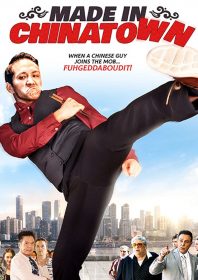
“Vinny” Chow (newcomer Jay Kwon) is a young New Yorker undergoing an identity crisis. He feels culturally distant from his Chinese roots, pressurised by an overbearing father and apathetic in his kung fu lessons. He feels a far greater kinship, however, to New York’s Italian American community, so he decides to relocate from Chinatown to Little Italy in an attempt to make it – Goodfellas style – as a mafioso. “In New York, you can be whatever you want,” he says, living out his ‘wise-guy’ fantasies as an errand-boy for the mob, while trying to impress the gangster’s moll. Because this film is a completely benign action comedy, the gangsters are in the food trade, instead of the drugs trade. Vinny starts hawking olive oil to the Asian community; at one point, he’s smacked around with a salami; another trader is really big in the grated cheese market. You get the idea. There’s another running gag about Vinny’s dad buying Chinese herbs to help with what seems to be erectile dysfunction. Clearly the script is dealing in broad comedic strokes, and luckily the impressive cast are happy to play along – including the likes of The Sopranos actors Vincent Pastore, Tony Darrow, and Tony Ray Rossi, who deliver every cliche with gusto. For kung fu film fans, there are some ringers in the room, including veteran Hong Kong star, Chiu Chi-ling (Kung Fu Hustle), and original Venoms crew member, Lo Meng, doing a wonderfully exaggerated turn as a maniacal triad boss. He makes a surreptitious attempt to take out the deli racket from his rivals, working in cahoots with another great character actor, Raymond J. Barry. Directed by stunt performers and coordinators Robert Samuels and James Lew, there is a vibrancy to the fight scenes, as you might expect – especially during the big punch-up at the end, which is when stunt performer Jay Kwon reveals his amazing moves, alongside martial artist Emmanuel Brown, who camps it up as the archetypal ‘gay best friend’. Given its ultra low-budget, some of the film’s presentation feels distinctly amateurish, but it is good-humoured and diverting, even if the resolution of the story seems to conflict with its overall message of acceptance and togetherness.
- Country: United States
- Action Director: Hector Soria
- Directed by: James Lew, Robert Samuels
- Starring: Celia Au, Chiu Chi-ling, Emmanuel Brown, James Lew, Jay Kwon, Lo Meng, Raymond J. Barry, Robert Samuels, Tony Darrow, Vincent Pastore
- Produced by: Gine Lui, Mark V Wiley, Shing Ka
- Written by: Mark V Wiley
- Studio: Nine East Productions, Tambuli Films













Thank you so much for your review. Much appreciated. I’d like only to mention two things:
Tony Sirico did not end up in the cast, so perhaps you are referring to Tony Ray Rossi?
And your final comment is not on point, or perhaps the ending was too subtle. You write, ” even if the resolution of the story seems to conflict with its overall message of acceptance and togetherness.”
Vinny comes to ‘accept who he is,” he “accepts the love of a sincere woman, not a girl who only dates men of power with something to offer HER.” and Vinny comes “together with and full acceptance of his own culture and people, without having to look toward acceptance in another to feel adequate about himself.”
Thank you for the review and taking time to watch the film. I appreciate it.
Hi Mark – thank you kindly for reaching out and leaving your comment, it is very much appreciated.
Re Tony Sirico, this is an error, thank you for pointing out and I have corrected the review.
Re the ending, I suppose it’s important to make clear that we are only ever watching Vinny’s very personal ‘coming-of-age’ story here, and not a wider social statement – although it’s certainly positive that he finally discovers the confidence and acceptance he has been searching for from within his own community, let’s hope it is not at the expense of his obvious love and affection for the wider Italian American community too.